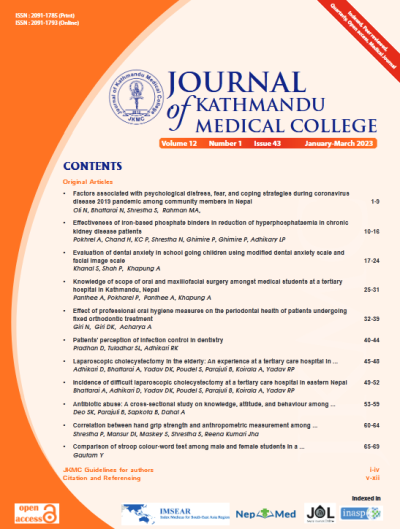Antibiotic abuse: A cross-sectional study on knowledge, attitude, and behaviour among undergraduate students of western Nepal
DOI:
https://doi.org/10.3126/jkmc.v12i1.56693Keywords:
Antibiotic abuse, Self-medication, University studentsAbstract
Background: Antibiotic abuse has drawn the attention of public health experts, stakeholders, and medical science due to the substantial economic loss that it causes to individuals and nation.
Objectives: To assess the knowledge, attitude, and behaviour on antibiotic abuse among undergraduate level students of Pokhara, Nepal.
Methods: This analytical cross-sectional study was conducted after ethical clearance in 361 undergraduate level students of Pokhara, Nepal from 2022 November to 2023 January. Convenience sampling technique was utilised for data collection. Data were analysed primarily by Chi-square test to find the associated factors using SPSS v.21.
Results: A total of 361 respondents participated, and 61.77% were female. Most of the respondents (67.31%) were from health sciences, while 32.68% of the respondent was of non-health sciences. The mean age of the respondents was 20.97 ± 1.56 years. More than half of the respondents had inadequate knowledge and unfavourable attitude towards antibiotics while the prevalence of self-medication was found to be 72.6%.
Conclusion: This study recommends for further large-scale research to understand the current state of antibiotic use and misuse among general population. Self-medication rate was high regardless of perceived knowledge and positive attitude. So, this study urges for the need of behavioural interventions that aims at raising awareness and establishing effective use of antibiotics.
Downloads
Downloads
Published
How to Cite
Issue
Section
License

This work is licensed under a Creative Commons Attribution-NonCommercial 4.0 International License.
Copyright © Journal of Kathmandu Medical College
The ideas and opinions expressed by authors or articles summarized, quoted, or published in full text in this journal represent only the opinions of the authors and do not necessarily reflect the official policy of Journal of Kathmandu Medical College or the institute with which the author(s) is/are affiliated, unless so specified.
Authors convey all copyright ownership, including any and all rights incidental thereto, exclusively to JKMC, in the event that such work is published by JKMC. JKMC shall own the work, including 1) copyright; 2) the right to grant permission to republish the article in whole or in part, with or without fee; 3) the right to produce preprints or reprints and translate into languages other than English for sale or free distribution; and 4) the right to republish the work in a collection of articles in any other mechanical or electronic format.




